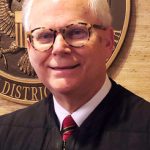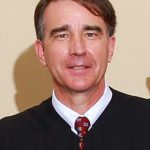The 12 Best 'Answers From the Bench' This Year
Judges offered candor and insight into their pet peeves, what keeps them up at night and how they came to the bench.
December 18, 2019 at 09:20 PM
8 minute read
 (Photo: Freedomz/Shutterstock.com)
(Photo: Freedomz/Shutterstock.com)
The judiciary has been described as the most transparent branch of government because judges are the only government officials who have to write an explanation for their decisions. But who hasn't occasionally looked at the people in black robes and seen an inscrutable black box instead?
We started "Questions for the Bench" this year to find out more about the jurists who determine the fate of litigation throughout the state.
Twelve judges generously answered our interrogatories, offering candor and insight into their journeys to the bench, their pet peeves and their deep concerns about the cases they handle. I'm happy to say that three more judges are working on answers that we hope to publish in the coming days and next year.
If you know a judge who is interested in participating next year, please let me know at [email protected].
 Judge Penny Freesemann, Chatham County Superior Court. (Courtesy photo)
Judge Penny Freesemann, Chatham County Superior Court. (Courtesy photo)"The point. Get to it." —Chief Judge Penny Haas Freesemann of Chatham County Superior Court, on habits she'd like lawyers appearing before her to change.
 U.S. District Judge Mark Cohen. (Courtesy photo)
U.S. District Judge Mark Cohen. (Courtesy photo)Judge Mark Cohen"If I could mandate one change in the practice of law, it would be to ban the use of e-mail communication between civil practitioners. The days of actually calling someone to discuss an issue (or, better yet, actually meeting with opposing counsel in someone's office) apparently have gone the way of the slide rule." —Judge Mark Cohen, U.S. District Court for the Northern District of Georgia
 Judge Elizabeth Gobeil, Georgia Court of Appeals. (Photo: John Disney/ALM)
Judge Elizabeth Gobeil, Georgia Court of Appeals. (Photo: John Disney/ALM)"The fear of misapplying the law, especially when someone's liberty is at stake. As a judge, I accept that it is not my role to decide what the law should be (versus what it is). But, as a human, there invariably are cases that will strike you as unfair or unjust, even though the result derives from the faithful and impartial application of the law. I channel those moments to remind myself of how high the stakes are (to the parties and often to future litigants and stakeholders) and to work harder to ensure the rule of law is applied correctly." —Judge Elizabeth Gobeil of the Georgia Court of Appeals, answering, "What keeps you up at night as a judge?"
 Judge Kimberly A. Childs, Cobb County Superior Court. (Photo: John Disney/ALM)
Judge Kimberly A. Childs, Cobb County Superior Court. (Photo: John Disney/ALM)"I remember one of the most frequently asked questions was 'When is my next court date?' And I remember volatile inmate behavior when they thought they were going to trial but never left the holding cell at the courthouse. Their desire to have their day in court indicates to me that, deep down, they believe our system works. I also think this background helps me recognize possible reasons why an incarcerated defendant may behave a certain way in the courtroom. Sometimes what may appear on the surface as disrespect or hostility may in fact be the result of reasonable frustration." —Judge Kim Childs of Cobb County Superior Court, answering a question about what she learned from a previous job as a guard in a DeKalb County jail.
 Judge Stephen S. "Steve" Goss, Georgia Court of Appeals. (Photo: John Disney/ALM)
Judge Stephen S. "Steve" Goss, Georgia Court of Appeals. (Photo: John Disney/ALM)"If the case was flawless, it likely would not be in a courtroom. I prefer that counsel tell me up front why the facts or law may be distinguishable and why their client should prevail." —The late Judge Steve Goss of the Georgia Court of Appeals, discussing pet peeves in briefing and arguments.
"The lawyering is different in that the attorneys that practice criminal law generally have more of a history with each other and an expectation that they will have future cases together. Criminal attorneys normally have a relationship with each other, and they seem more comfortable operating based on a handshake or a commitment made in the hallway before court begins.
 Judge George Hutchinson, Superior Court, Gwinnett County. (Courtesy photo)
Judge George Hutchinson, Superior Court, Gwinnett County. (Courtesy photo)"Although there are exceptions, that's not been my experience in civil litigation. Where those trust relationships don't exist, attorneys, perhaps rightfully so, tend to protect themselves and their clients with formal motions, emails and letters documenting conversations, consent orders and all manner of other documentation. It's really a more cautious—less trusting approach to dealing with other side." —Chief Judge George Hutchinson of Gwinnett Superior Court, comparing his background as a prosecutor with his observation of civil litigation as a judge.
 Chief Judge J. Randal Hall of the U.S. District Court for the Southern District of Georgia. (Courtesy photo)
Chief Judge J. Randal Hall of the U.S. District Court for the Southern District of Georgia. (Courtesy photo)"I watch juries and they tend to zone out after 15 minutes. I frequently offer lawyers this tip, but few ever heed my advice." —Chief Judge J. Randal Hall of the U.S. District Court for the Southern District of Georgia, asked about pet peeves in trial practice.
 Judge E. Trenton Brown III, Georgia Court of Appeals. (Photo: John Disney/ALM)
Judge E. Trenton Brown III, Georgia Court of Appeals. (Photo: John Disney/ALM)"Whether it be in a courtroom or pleading, body language and words matter. I have been particularly surprised by the language unsuccessful counsel are willing to use in their motions for reconsideration." —Judge Trent Brown of the Georgia Court of Appeals, asked about pet peeves.
 Justice Sarah H. Warren, Georgia Supreme Court. (Photo: John Disney/ALM)
Justice Sarah H. Warren, Georgia Supreme Court. (Photo: John Disney/ALM)"With respect to argument, I am always surprised when an attorney is not prepared to engage with the court. We want oral argument to be a conversation between the advocates and the Justices, not a mere recitation of written briefs. A great way to prepare for that experience is to watch prior oral arguments—even arguments focusing on different legal issues—that are posted on the Supreme Court website." —Justice Sarah Warren of the Supreme Court of Georgia, asked about pet peeves.
 Judge Paige Reese Whitaker, Superior Court, Fulton County. (Photo: John Disney/ALM)
Judge Paige Reese Whitaker, Superior Court, Fulton County. (Photo: John Disney/ALM)"There are no lawyers in my family, so the spark for me was actually a government class I took my senior year in high school, taught by Ms. Nancy Heath. The American system of government is a beautiful, inspired, delicate system, and both the legislative and judicial branches particularly intrigued me." —Judge Paige Reese Whitaker of Fulton County Superior Court, discussing how she came to be a lawyer.
 Christian Coomer (Photo: John Disney/ALM)
Christian Coomer (Photo: John Disney/ALM)"As a person who has worked at least two or three jobs at any given time in my adult life, I'm a very forgiving audience. That said, it is striking to read a document that looks like it was not proofread before it was filed. When a writing is full of typographical, grammatical and spelling errors, it leaves the reader with the impression that the writer didn't think it was very important and, perhaps, should not be taken too seriously." —Judge Christian Coomer of the Georgia Court of Appeals, asked about pet peeves.
 Judge Clay Land, Middle District of Georgia. (Courtesy photo)
Judge Clay Land, Middle District of Georgia. (Courtesy photo)"Taking away someone's freedom is an awesome responsibility, particularly when it affects other innocent persons, such as family members. So I agonize more over sentencing decisions than any other part of my job." —Chief Judge Clay Land of U.S. District Court for the Middle District of Georgia, discussing what keeps him up at night.
This content has been archived. It is available through our partners, LexisNexis® and Bloomberg Law.
To view this content, please continue to their sites.
Not a Lexis Subscriber?
Subscribe Now
Not a Bloomberg Law Subscriber?
Subscribe Now
NOT FOR REPRINT
© 2025 ALM Global, LLC, All Rights Reserved. Request academic re-use from www.copyright.com. All other uses, submit a request to [email protected]. For more information visit Asset & Logo Licensing.
You Might Like
View All

Plaintiffs Attorneys Awarded $113K on $1 Judgment in Noise Ordinance Dispute
4 minute read
'Didn't Notice Patient Wasn't Breathing': $13.7M Verdict Against Anesthesiologists
12 minute readTrending Stories
- 1Orrick Loses 10-Lawyer Team to Herbert Smith in Germany
- 2‘The US Market Is Critical’: KPMG’s Former Head of Global Legal Services On the Legal Arm of the Big Four Firm Entering the US
- 3Justice Marguerite Grays Elevated to Co-Chair Panel That Advises on Commercial Division
- 4McDermott Continues UK Growth With Another Partner Hire in London
- 52 Texas Lawyers Vie for Prominent Post: 2025-2026 Election
Who Got The Work
J. Brugh Lower of Gibbons has entered an appearance for industrial equipment supplier Devco Corporation in a pending trademark infringement lawsuit. The suit, accusing the defendant of selling knock-off Graco products, was filed Dec. 18 in New Jersey District Court by Rivkin Radler on behalf of Graco Inc. and Graco Minnesota. The case, assigned to U.S. District Judge Zahid N. Quraishi, is 3:24-cv-11294, Graco Inc. et al v. Devco Corporation.
Who Got The Work
Rebecca Maller-Stein and Kent A. Yalowitz of Arnold & Porter Kaye Scholer have entered their appearances for Hanaco Venture Capital and its executives, Lior Prosor and David Frankel, in a pending securities lawsuit. The action, filed on Dec. 24 in New York Southern District Court by Zell, Aron & Co. on behalf of Goldeneye Advisors, accuses the defendants of negligently and fraudulently managing the plaintiff's $1 million investment. The case, assigned to U.S. District Judge Vernon S. Broderick, is 1:24-cv-09918, Goldeneye Advisors, LLC v. Hanaco Venture Capital, Ltd. et al.
Who Got The Work
Attorneys from A&O Shearman has stepped in as defense counsel for Toronto-Dominion Bank and other defendants in a pending securities class action. The suit, filed Dec. 11 in New York Southern District Court by Bleichmar Fonti & Auld, accuses the defendants of concealing the bank's 'pervasive' deficiencies in regards to its compliance with the Bank Secrecy Act and the quality of its anti-money laundering controls. The case, assigned to U.S. District Judge Arun Subramanian, is 1:24-cv-09445, Gonzalez v. The Toronto-Dominion Bank et al.
Who Got The Work
Crown Castle International, a Pennsylvania company providing shared communications infrastructure, has turned to Luke D. Wolf of Gordon Rees Scully Mansukhani to fend off a pending breach-of-contract lawsuit. The court action, filed Nov. 25 in Michigan Eastern District Court by Hooper Hathaway PC on behalf of The Town Residences LLC, accuses Crown Castle of failing to transfer approximately $30,000 in utility payments from T-Mobile in breach of a roof-top lease and assignment agreement. The case, assigned to U.S. District Judge Susan K. Declercq, is 2:24-cv-13131, The Town Residences LLC v. T-Mobile US, Inc. et al.
Who Got The Work
Wilfred P. Coronato and Daniel M. Schwartz of McCarter & English have stepped in as defense counsel to Electrolux Home Products Inc. in a pending product liability lawsuit. The court action, filed Nov. 26 in New York Eastern District Court by Poulos Lopiccolo PC and Nagel Rice LLP on behalf of David Stern, alleges that the defendant's refrigerators’ drawers and shelving repeatedly break and fall apart within months after purchase. The case, assigned to U.S. District Judge Joan M. Azrack, is 2:24-cv-08204, Stern v. Electrolux Home Products, Inc.
Featured Firms
Law Offices of Gary Martin Hays & Associates, P.C.
(470) 294-1674
Law Offices of Mark E. Salomone
(857) 444-6468
Smith & Hassler
(713) 739-1250







